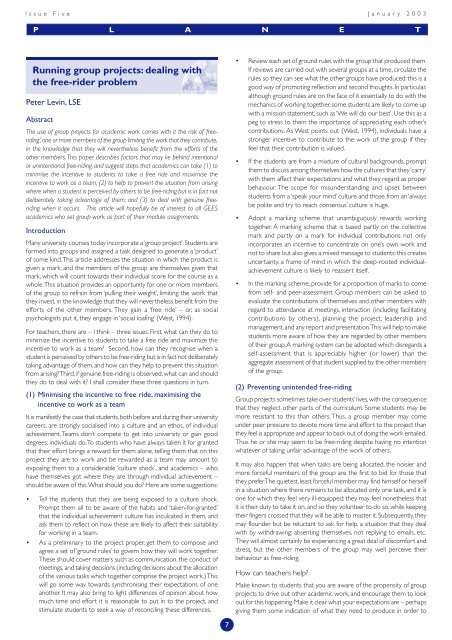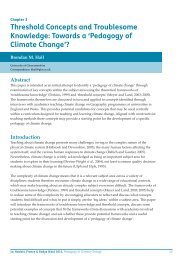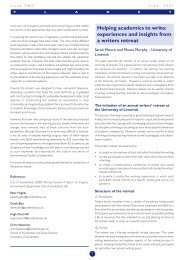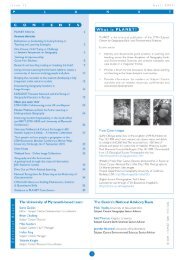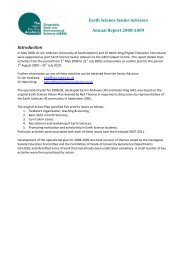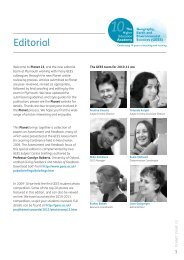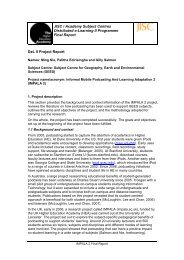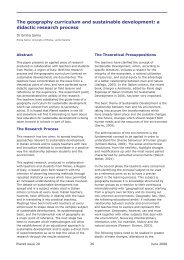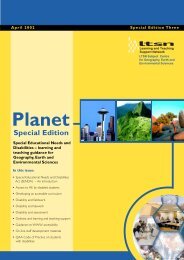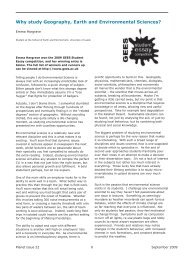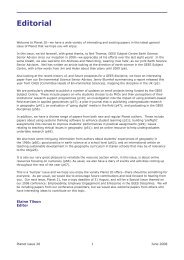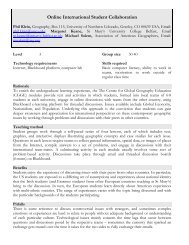Dealing With The free-rider Problem - GEES Subject Centre Home
Dealing With The free-rider Problem - GEES Subject Centre Home
Dealing With The free-rider Problem - GEES Subject Centre Home
Create successful ePaper yourself
Turn your PDF publications into a flip-book with our unique Google optimized e-Paper software.
Issue Five January 2003<br />
P L A N E T<br />
Running group projects: dealing with<br />
the <strong>free</strong>-<strong>rider</strong> problem<br />
Peter Levin, LSE<br />
Abstract<br />
<strong>The</strong> use of group projects for academic work carries with it the risk of ‘<strong>free</strong>riding’,<br />
one or more members of the group limiting the work that they contribute,<br />
in the knowledge that they will nevertheless benefit from the efforts of the<br />
other members. This paper describes factors that may lie behind intentional<br />
or unintentional <strong>free</strong>-riding, and suggest steps that academics can take (1) to<br />
minimise the incentive to students to take a <strong>free</strong> ride and maximise the<br />
incentive to work as a team; (2) to help to prevent the situation from arising<br />
where when a student is perceived by others to be <strong>free</strong>-riding but is in fact not<br />
deliberately taking advantage of them; and (3) to deal with genuine <strong>free</strong>riding<br />
when it occurs. This article will hopefully be of interest to all <strong>GEES</strong><br />
academics who set group-work as part of their module assignments.<br />
Introduction<br />
Many university courses today incorporate a ‘group project’. Students are<br />
formed into groups and assigned a task designed to generate a ‘product’<br />
of some kind. This article addresses the situation in which the product is<br />
given a mark, and the members of the group are themselves given that<br />
mark, which will count towards their individual score for the course as a<br />
whole. This situation provides an opportunity for one or more members<br />
of the group to refrain from ‘pulling their weight’, limiting the work that<br />
they invest, in the knowledge that they will nevertheless benefit from the<br />
efforts of the other members. <strong>The</strong>y gain a ‘<strong>free</strong> ride’ – or, as social<br />
psychologists put it, they engage in ‘social loafing’ (West, 1994).<br />
For teachers, there are – I think – three issues. First, what can they do to<br />
minimize the incentive to students to take a <strong>free</strong> ride and maximize the<br />
incentive to work as a team? Second, how can they recognise when a<br />
student is perceived by others to be <strong>free</strong>-riding but is in fact not deliberately<br />
taking advantage of them, and how can they help to prevent this situation<br />
from arising? Third, if genuine <strong>free</strong>-riding is observed, what can and should<br />
they do to deal with it? I shall consider these three questions in turn.<br />
(1) Minimising the incentive to <strong>free</strong> ride, maximising the<br />
incentive to work as a team<br />
It is manifestly the case that students, both before and during their university<br />
careers, are strongly socialised into a culture and an ethos, of individual<br />
achievement. Teams don’t compete to get into university or gain good<br />
degrees: individuals do. To students who have always taken it for granted<br />
that their effort brings a reward for them alone, telling them that on this<br />
project they are to work and be rewarded as a team may amount to<br />
exposing them to a considerable ‘culture shock’, and academics – who<br />
have themselves got where they are through individual achievement –<br />
should be aware of this. What should you do? Here are some suggestions:<br />
• Tell the students that they are being exposed to a culture shock.<br />
Prompt them all to be aware of the habits and ‘taken-for-granted’<br />
that the individual achievement culture has inculcated in them, and<br />
ask them to reflect on how these are likely to affect their suitability<br />
for working in a team.<br />
• As a preliminary to the project proper, get them to compose and<br />
agree a set of ‘ground rules’ to govern how they will work together.<br />
<strong>The</strong>se should cover matters such as communication, the conduct of<br />
meetings, and taking decisions (including decisions about the allocation<br />
of the various tasks which together comprise the project work.) This<br />
will go some way towards synchronising their expectations of one<br />
another. It may also bring to light differences of opinion about how<br />
much time and effort it is reasonable to put in to the project, and<br />
stimulate students to seek a way of reconciling these differences.<br />
• Review each set of ground rules with the group that produced them.<br />
If reviews are carried out with several groups at a time, circulate the<br />
rules so they can see what the other groups have produced: this is a<br />
good way of promoting reflection and second thoughts. In particular,<br />
although ground rules are on the face of it essentially to do with the<br />
mechanics of working together, some students are likely to come up<br />
with a mission statement, such as ‘We will do our best’. Use this as a<br />
peg to stress to them the importance of appreciating each other’s<br />
contributions. As West points out (West, 1994), individuals have a<br />
stronger incentive to contribute to the work of the group if they<br />
feel that their contribution is valued.<br />
• If the students are from a mixture of cultural backgrounds, prompt<br />
them to discuss among themselves how the cultures that they ‘carry’<br />
with them affect their expectations and what they regard as proper<br />
behaviour. <strong>The</strong> scope for misunderstanding and upset between<br />
students from a ‘speak your mind’ culture and those from an ‘always<br />
be polite and try to reach consensus’ culture is huge.<br />
• Adopt a marking scheme that unambiguously rewards working<br />
together. A marking scheme that is based partly on the collective<br />
mark and partly on a mark for individual contributions not only<br />
incorporates an incentive to concentrate on one’s own work and<br />
not to share but also gives a mixed message to students: this creates<br />
uncertainty, a frame of mind in which the deep-rooted individualachievement<br />
culture is likely to reassert itself.<br />
• In the marking scheme, provide for a proportion of marks to come<br />
from self- and peer-assessment. Group members can be asked to<br />
evaluate the contributions of themselves and other members with<br />
regard to attendance at meetings, interaction (including facilitating<br />
contributions by others), planning the project, leadership and<br />
management, and any report and presentation. This will help to make<br />
students more aware of how they are regarded by other members<br />
of their group. A marking system can be adopted which disregards a<br />
self-assessment that is appreciably higher (or lower) than the<br />
aggregate assessment of that student supplied by the other members<br />
of the group.<br />
(2) Preventing unintended <strong>free</strong>-riding<br />
Group projects sometimes take over students’ lives, with the consequence<br />
that they neglect other parts of the curriculum. Some students may be<br />
more resistant to this than others. Thus, a group member may come<br />
under peer pressure to devote more time and effort to the project than<br />
they feel is appropriate and appear to back out of doing the work entailed.<br />
Thus he or she may seem to be <strong>free</strong>-riding despite having no intention<br />
whatever of taking unfair advantage of the work of others.<br />
It may also happen that when tasks are being allocated, the noisier and<br />
more forceful members of the group are the first to bid for those that<br />
they prefer. <strong>The</strong> quietest, least forceful member may find himself or herself<br />
in a situation where there remains to be allocated only one task, and it is<br />
one for which they feel very ill-equipped: they may feel nonetheless that<br />
it is their duty to take it on, and so they volunteer to do so, while keeping<br />
their fingers crossed that they will be able to master it. Subsequently, they<br />
may flounder but be reluctant to ask for help, a situation that they deal<br />
with by withdrawing: absenting themselves, not replying to emails, etc.<br />
<strong>The</strong>y will almost certainly be experiencing a great deal of discomfort and<br />
stress, but the other members of the group may well perceive their<br />
behaviour as <strong>free</strong>-riding.<br />
How can teachers help?<br />
Make known to students that you are aware of the propensity of group<br />
projects to drive out other academic work, and encourage them to look<br />
out for this happening. Make it clear what your expectations are – perhaps<br />
giving them some indication of what they need to produce in order to<br />
7
Issue Five January 2003<br />
P L A N E T<br />
get a particular grade and emphasising that you don’t expect them to<br />
work through the night and neglect their other work. Ask them at regular<br />
intervals whether they feel the project is under control, and be on the<br />
lookout for different members of a group giving different answers to<br />
your question, which is likely to reveal the existence of an issue which<br />
needs to be discussed, possibly with yourself in the chair.<br />
Also, encourage teams to adopt a procedure for allocating tasks that<br />
does not allow anyone to ‘get in first’ – a sealed-bid procedure, for example<br />
– and to check that everyone is positively happy with the outcome. Check<br />
for yourself, too. If anyone betrays unhappiness, it may be appropriate to<br />
suggest job-sharing or taking a fresh look at how they have broken the<br />
assignment down into tasks.<br />
(3) <strong>Dealing</strong> with <strong>free</strong>-riding when it occurs<br />
As their teacher, you may be the last person to know that there are<br />
students who consider that there is a <strong>free</strong>-<strong>rider</strong> in their group, taking<br />
advantage of them and their hard work. <strong>The</strong>y are likely to feel that the<br />
issue is one that they should deal with themselves, and to be reluctant to<br />
‘tell-tales’ on a fellow student. Underneath, though, they may feel very<br />
angry, and they may find the uncertainty very frustrating and difficult to<br />
handle. It is in the nature of group project work in an academic context<br />
that members take away their individual tasks and then come back to the<br />
group with the work they have done. Typically, <strong>free</strong>-<strong>rider</strong>s will take away<br />
their task but not produce the work, absenting themselves or making<br />
excuses and promising to deliver ‘soon’, so other group members don’t<br />
know whether to do the work themselves or to trust the other member<br />
and hold the project in abeyance until he or she produces; and to hope<br />
that what is produced will be what they need. <strong>The</strong> problem may be not<br />
so much that one member is unreliable and unproductive – aggravating<br />
though that is – but that the conscientious members are crippled by their<br />
feelings of anger towards the <strong>free</strong>-<strong>rider</strong> and of frustration resulting from<br />
their inability to influence events and their uncertainty as to what course<br />
of action they should take.<br />
Again, what can teachers do to help?<br />
• You can require each group to submit, soon after starting work, a<br />
schedule showing the task or tasks that each member is to undertake.<br />
Groups can also be required to notify you of any subsequent<br />
amendments to the schedule. This notification will be a factual matter,<br />
so giving it will not carry any connotation of telling tales, and it will<br />
allow you to see if work is being reallocated away from one member,<br />
and to enquire – if you think it appropriate – into the reasons behind<br />
such reallocation. Informing students at the outset of this requirement<br />
will itself be a disincentive to <strong>free</strong>-riding.<br />
• You can point out to the conscientious students that dealing with<br />
‘<strong>free</strong>-<strong>rider</strong>s’ can actually be a worthwhile learning experience for<br />
them, if they can develop strategies to channel their anger and<br />
frustration into positive action. Such strategies might include: discussing<br />
their feelings with a neutral person, a facilitator; asking the <strong>free</strong>-<strong>rider</strong><br />
if he or she is encountering difficulties that they haven’t made known<br />
to the other group members; explaining to the <strong>free</strong>-<strong>rider</strong> their<br />
difficulty with the situation that they find themselves in; giving the<br />
<strong>free</strong>-<strong>rider</strong> a deadline for the producing of work; and agreeing among<br />
themselves how they will do the work if it is not forthcoming.<br />
Conclusion<br />
<strong>The</strong> above suggestions will all help to minimise the extent of <strong>free</strong>-riding<br />
and to assist conscientious students to deal with it if it does arise. <strong>The</strong><br />
demands that they make on teachers are not onerous. <strong>The</strong>y do, however,<br />
require teachers to do more than merely form students into groups, give<br />
them their assignment, and send them away to get on with it.<br />
Reference<br />
West, M. (1994) Effective Teamwork (Leicester: British Psychological<br />
Society)<br />
Check out the indexed references to ‘social loafing’.<br />
Further Reading<br />
Ciborra, C. (1993) Teams, Markets and Systems (Cambridge: Cambridge<br />
University Press).<br />
Levin, P. (2002) <strong>The</strong> Good Teamwork Guide: How to make a success of your<br />
group project, for undergraduates and Master’s students (London: guidesfor-students.com,<br />
2002). This publication can also be downloaded from<br />
http://www.guides-for-students.com<br />
See also various materials on http://www.teamwork.ac.uk<br />
Acknowledgments<br />
This paper is a product of the Higher Education Innovations Fund project,<br />
Marketing Graduates’ Skills, undertaken and managed jointly by myself<br />
and Ivan Kent (Oxford Brookes University) between August 2000 and<br />
October 2002. We gratefully acknowledge the support of the Department<br />
for Education and Skills, which financed the project; of the Higher Education<br />
Funding Council for England and the National Coordination Team, which<br />
administered it; of staff and students at the London School of Economics,<br />
with whom it has been a pleasure and privilege to work; of the Teaching<br />
and Learning Development Office at LSE, headed by Dr␣ Liz Barnett, which<br />
gave the project a home; and of the project’s advisory group, chaired by<br />
Ms␣ Serena Mackesy, which took an active interest and encouraged us<br />
throughout.<br />
Peter Levin<br />
London School of Economics<br />
p.levin@clara.net<br />
©<br />
Copyright for all published material in PLANET is held by the<br />
© Copyright<br />
LTSN-<strong>GEES</strong> <strong>Subject</strong> <strong>Centre</strong>, unless otherwise stated.<br />
Contributors are permitted to use their material elsewhere<br />
without prior permission. However, the following note should<br />
be included: “First published in PLANET (date, issue number)”.<br />
Permission is required for reproduction or amendment by a<br />
third party.<br />
<strong>The</strong> opinions expressed in this journal are not necessarily those<br />
of the LTSN <strong>Subject</strong> <strong>Centre</strong> for Geography, Earth and<br />
Environmental Sciences. Whilst every effort is made to ensure<br />
the accuracy of the content, we cannot accept liability for<br />
errors or omissions.<br />
8


